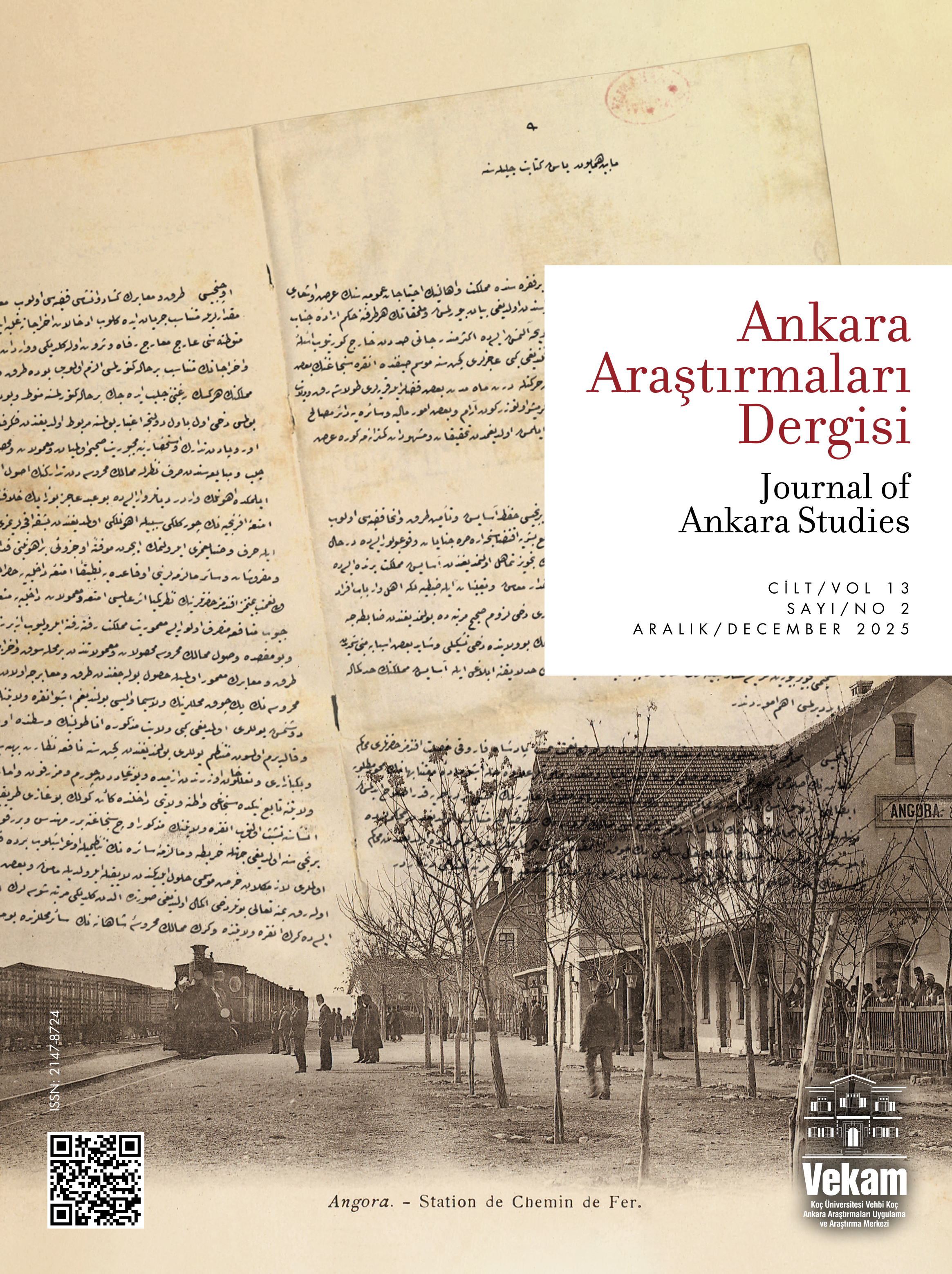Türkiye Büyük Millet Meclisinin 100. Yılında Mustafa Kemal Paşa’nın Başkumandanlık ve Meclis Reisliği Mühürleri
Murat TuranDokuz Eylül Üniversitesi, Edebiyat Fakültesi, Tarih Bölümü, İzmir, TürkiyeAnkara’da bulunan Birinci Büyük Millet Meclisi binası, 23 Nisan 1920’den, 18 Ekim 1924’e kadar Türkiye Parlamentosuna hizmet vermiş bir binaydı. 1924’ten sonra Cumhuriyet Halk Fırkası genel merkezi olarak kullanılmaya başlanan bina, 1952’de Millî Eğitim Bakanlığına devredildi. Bina, 23 Nisan 1961’den, 1981’e kadar Birinci Büyük Millet Meclisi Müzesi adıyla faaliyetteydi. 1981’de yapılan düzenlemeyle birlikte adı Kurtuluş Savaşı Müzesi olarak değiştirildi ve bina günümüze kadar bu şekilde hizmet vermeye devam etti. Bugün bu müzede yer alan ve üzerinde “Türkiye Büyük Millet Meclisi Orduları Başkumandanlığı” ve “Türkiye Büyük Millet Meclisi Reisi Mustafa Kemal” yazılı iki mühür sergilenmektedir. Mühürlerden birincisi Millî Mücadele ordusunu, ikincisi ise Millî Mücadele Meclisini temsil etmektedir. Bugünden bakılırsa, Başkumandanlık mührü Millî Mücadele’nin 100. yılını [2019], Meclis Reisliği mührü ise Türkiye Büyük Millet Meclisinin 100. yılını [2020] temsil etmektedir. Söz konusu mühürler, tek parti döneminin en belirgin isimlerinden biri olan Recep Peker tarafından 1920’lerin başından, 1940’lara kadar muhafaza edilmişti. Peker, 3 Nisan 1942’te Mecliste yapmış olduğu bir konuşmada, Mustafa Kemal Paşa’nın Başkumandanlık ve Meclis Reisliği mühürlerinin kendisinde olduğunu açıklamıştı. Peker 1920’de Heyeti Temsiliye çalışmalarına katılmış ve Türkiye Büyük Millet Meclisi açılınca Başkâtiplik görevine getirilmiş bir isimdi. Mustafa Kemal Atatürk ile olan yakınlığı ise Ankara’ya geldiği 4 Şubat 1920’den, son görüşme tarihi olan 5 Nisan 1938’e kadar sürmüştü. Peker’in en dikkat çekici özelliği, Atatürk’e ve dolayısıyla Kemalizm’e olan sarsılmaz duygu ile bağlılığıydı. Millî Mücadele’nin hatırası olan bu iki mührü yirmi yıldan uzun süre boyunca saklaması bu bağlılığın en önemli sebebiydi. Çalışmada, Kurtuluş Savaşı Müzesi’nde sergilenmekte olan Başkumandanlık ve Meclis Reisliği mühürlerinin muhafaza edilme, ortaya çıkış ve sergilenme öyküsü ele alınacaktır.
Anahtar Kelimeler: Mustafa Kemal Atatürk, Recep Peker, Millî Mücadele, Türkiye Büyük Millet Meclisi, Başkumandanlık, Büyük Taarruz, Mühürler
On the 100th Anniversary of the Grand National Assembly of Turkey, Supreme Military Command and President of the Assembly Seals of Mustafa Kemal Pasha
Murat TuranDokuz Eylül University, Faculty of Literature, Department of History, İzmir, TurkeyThe First Grand National Assembly Building, Ankara, was the home of the Turkish Parliament between April 23, 1920 and October 18, 1924. The building was then used as the Republican People’s Party headquarters until it was given to the Ministry of National Education in 1952. It was actively used as the First Grand National Assembly Museum between April 23, 1961 and 1981. Following an arrangement made in 1981, the name of the museum was changed to The War of Independence Museum, and it remains so today. There are two seals on permanent exhibition at the museum with the inscriptions “The Supreme Military Command of the Armed Forces of Grand National Assembly of Turkey” and “President of Grand National Assembly of Turkey, Mustafa Kemal”. The first seal commemorates the National Military Campaign during the War of Independence and the second is from the National Assembly of this period. As of the time of writing, the seal of the Supreme Military Command represents the 100th anniversary [2019] of the National Struggle for Independence, and the seal of President of Grand National Assembly represents the 100th anniversary [2020] of the Grand National Assembly of Turkey. The aforementioned seals were cared for from the early 1920s to the 1940s by Recep Peker, one of the most prominent names of the single-party era. In one of his speeches made in the Parliament on April 3, 1942, Peker announced that he held the seals of Mustafa Kemal Pasha’s Supreme Military Command and President of Grand National Assembly. Peker was part of the Representative Committee of 1920 and was promoted to the position of First Secretary upon the founding of the Grand National Assembly of Turkey. His close relationship with Mustafa Kemal Atatürk lasted from February 4, 1920, the date of his arrival in Ankara, until the date of their last meeting on April 5, 1938. Peker is well known for his firm devotion to Atatürk and therefore to Kemalism, and it was this devotion that led him to carefully preserve the aforementioned seals, commemorating the National Campaign for Independence, for more than twenty years. In this article, the story of the preservation, unveiling and display of the Seals of Supreme Military Command and President of Grand National Assembly, which are exhibited in the War of Independence Museum, is investigated.
Keywords: Mustafa Kemal Atatürk, Recep Peker, National Struggle, Grand National Assembly of Turkey, Supreme Military Command, Great Offensive, Seals
Makale Dili: Türkçe













